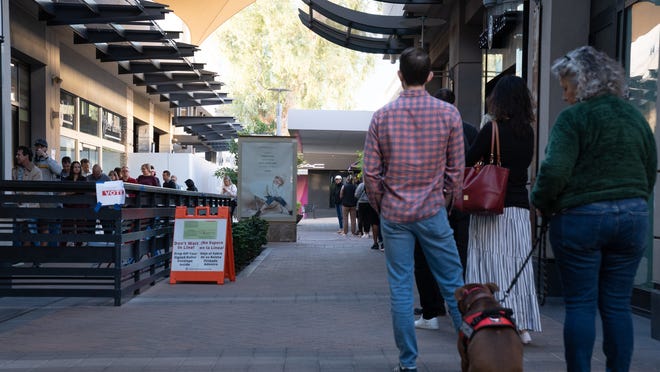Proposition 211: Ballot measure to require disclosure for political spending wins in Arizona
 Mary Jo Pitzl
Mary Jo Pitzl
Voters pulled back the curtain on anonymous campaign spending Tuesday, approving a ballot measure that requires public disclosure of big-dollar donors to political committees.
Proposition 211 jumped to an early and big lead and never let up, winning in all 15 counties. The Associated Press declared the measure a win, even as votes were still being tallied, based on its lopsided advantage.
The win caps a nearly decade-long effort by former Arizona Attorney General Terry Goddard to require disclosure of the people paying for political advertisements sponsored by vaguely named political committees.
“We should not be surprised that Arizonans love sunshine," Goddard said, a nod to the adage that sunshine is the best disinfectant.
The Voters' Right to Know Act, as backers titled the measure, requires disclosure of the donors who currently can give to an umbrella organization and not have their names reported. The ballot initiative is an attempt to put some sunlight on so-called "dark money" groups, in the belief that donors should be able to stand behind the positions they take in political ads.
In this election cycle alone, political committees that do not have to name their donors have spent millions of dollars both opposing candidates and promoting them.
There are some limits to the ballot measure: Disclosure would only happen if an individual gave $5,000 or more to a committee that spent at least $50,000 on a given statewide or legislative race or ballot proposition. That was designed to keep the focus on the bigger spenders and the high-dollar ads they purchase, said Goddard, a co-chairman of the Voter's Right to Know campaign.
For local elections, the limits would drop to $2,500 for individual contributions and $25,000 for a committee's spending.
Goddard called the measure's strong showing a bright spot of bipartisan unity in the current hyper-partisan political atmosphere.
“To get over 70% (approval), you’re appealing to every aspect of the political spectrum," he said. He added he hopes the measure will curb the often vitriolic nature of campaigns, since the people paying for political ads will have their names attached to the spending.
He also predicted that political committees with innocent-sounding names such as "Americans for Peanut Butter" will evaporate.
“I think the groups do go away because the only reason they exist is to hide the identity of the original donor," he said.
Proposition 211 measure drew strong bipartisan in opinion polls and the support of allies such as the League of Women Voters and the Arizona Alliance of NonProfits. Former Gov. Fife Symington, a Republican, spoke in favor of the measure — creating a common interest between the two former rivals for the Governor's Office.
Symington argued that candidates and proposition proponents who have to contend with dark money attacks are like "being in a boxing match with an opponent you can't see."
The Arizona Free Enterprise Club led the charge against Proposition 211. A dark money group itself, it argued the measure is an infringement on political speech. The club has hinted it might consider suing to block the act as unconstitutional if voters approve it.
But Goddard countered, noting that current law requires anyone who gives $50 or more to a candidate or ballot campaign to disclose their name, address and employer. Why, he asks rhetorically, should the donors to a committee that spends thousands on a campaign get shielded from public disclosure when donors with much smaller contributions have done so for years?
But, he added, he expects a legal challenge.
“These guys never say die and they have unlimited resources," he said of the Free Enterprise Club and its unnamed backers.
Is messenger important, or message?
The club's president, Scot Mussi, said the ballot measure would force groups such as the Sierra Club and other nonprofit organizations to make their donor lists public. However, Proposition 211 allows for an opt-out if anyone wants to ensure that their donation never goes to promote a political cause or candidate.
Goddard was the target of dark money spent in his unsuccessful 2014 bid for Arizona secretary of state. This is the fourth attempt he has made since then to curb the influence of dark money, working with the Campaign Legal Center to craft the measure. The center was founded by Trevor Potter, former Republican chairman of the Federal Election Commission.
He contends that if donors knew their names would get connected to what are usually negative ads, they'd think twice about giving.
But Mussi said the act places too much emphasis on the messenger, arguing it's the campaign message that is important, regardless of the individuals paying to convey it.
The Arizona Citizens Clean Elections Commission will administer the act. A 1% charge on criminal offenses and civil violations will cover the cost of running the program.
Reach the reporter at maryjo.pitzl@arizonarepublic.com and follow her on Twitter @maryjpitzl.
Support local journalism. Subscribe to azcentral.com today.